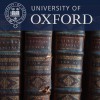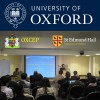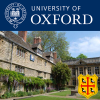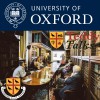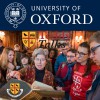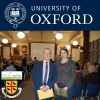St Edmund Hall
Relevant Links
St Edmund Hall is a friendly, informal college with a strong sense of community; an excellent place for academic and social life. We admit about 115 undergraduates every year, evenly divided between sciences and arts, who bring a wide range of intellectual, sporting and other interests. We take a keen interest in students’ careers: our Bridge to Business programme, funded by the generosity of a former student, is particularly popular.
We also have a strong commitment to graduate students and graduate study. Graduate students form an increasing proportion of the Hall and represent a diverse population of students from across the world studying a wide range of subjects.
With our roots in the early 13th century, we are the only medieval academic Hall to have survived. St Edmund Hall formally became a college on being granted a Royal Charter in 1957. Our architecture is a happy blend of ancient and modern. The library was the medieval church of St Peter-in-the-East, a large and beautiful building; much of the front quadrangle is 16th- and 17th-century; the remainder of our buildings are modern.
Our graduates include Terry Jones (of Monty Python), John Wells (co-founder of Private Eye), Anna Botting (Sky News journalist) and Dr Michael Nazir-Ali (former Bishop of Rochester).
| # | Episode Title | Description | People | Date | |
|---|---|---|---|---|---|
| 71 | A Conversation about Bipolar Disorder and Creative Process: Lucy Newlyn and Richard Lawes | A Conversation about Bipolar Disorder and Creative Process: Lucy Newlyn and Richard Lawes. This followed the publication, earlier this year, of Lucy's 15-year memoir, Diary of a Bipolar Explorer. | Lucy Newlyn, Richard Lawes, Will Donaldson | 30 May 2018 | |
| 70 | Empire of Things: A New History of Humans and Their Stuff | Professor Frank Trentmann (Birkbeck, University of London) sketches the history of consumption to the present day, and examines the historical dynamics that have shaped our material lifestyles. | Frank Trentmann | 04 Dec 2017 | |
| 69 | UK National Debt: A Historical Perspective | The UK national debt is currently the highest it's ever been, and a lot larger than many other countries. This talk takes a look behind the figures, and asks why it is important, whether we should be worried, and looks at the reasons for its growth. | Martin Slater | 07 Apr 2017 | |
| 68 | Ending Poverty? | Linda Yueh (Fellow by Special Election in Economics) talks about ending poverty. | Linda Yueh | 03 Apr 2017 | |
| 67 | Was There History in the Middle Ages? | Did medieval writers think they were writing history? This talk takes a closer look at the various forms of ‘history’ during this period. Emily A. Winkler is (John Cowdrey Junior Research Fellow in History). | Emily A Winkler | 03 Apr 2017 | |
| 66 | What Does Philosophy Have to Do with Neuroscience? | When you examine the brain, you can learn a lot and see chemical interactions, but you cannot find anything about the first-person nature of things we experience as humans, such as colours and pain. | Paul Skokowski | 03 Apr 2017 | |
| 65 | Advanced LIGO: the New Era of Gravitational Wave Astronomy | Why has the recent detection of gravitational waves been one of the most important discoveries in modern times for astrophysics? And what are the implications of the new Advanced LIGO gravitational-wave detector for future discoveries about black holes? | Philipp Podsiadlowski | 03 Apr 2017 | |
| 64 | Lithium-ion Batteries and Beyond | Batteries are one of the most efficient ways to store energy, and there has been a massive increase recently in the use of lithium-ion batteries, particularly in electric cars. | Mauro Pasta | 03 Apr 2017 | |
| 63 | ‘Boom, ratatata, hui-hui-sss-ttt, woouum’ - Children’s Views of World War II | How do people remember the past? Alex Lloyd (Lecturer, German Language and Literature) looks at essays written by children in Germany after the Second World War–examining the words and tone; the political framing; and the challenges for translating them. | Alex Lloyd | 03 Apr 2017 | |
| 62 | Banned Books: Hus and Luther in the Teddy Hall Library | This talk focusses on a first edition of the collected works of Jan Hus, from the collection in St Edmund Hall’s Old Library, written in the fifteenth century but first printed in 1558 together with letters of recommendation from Martin Luther. | Henrike Lähnemann | 03 Apr 2017 | |
| 61 | Merchants’ Marks in Medieval English Books | Merchants’ marks were used initially as a tool of commerce, on consignments of goods, in the Middle Ages. In the sixteenth century, however, they became more like a coat of arms for people who didn’t have one – a form of professional identity. | Thomas Kittel | 03 Apr 2017 | |
| 60 | Extreme Clocks: Physics with Pulsars | An introduction to pulsars: objects that have more mass than the sun but are only around 20km in diameter, possessing an extremely high rotational stability and a very strong magnetic field. | Aris Karastergiou | 03 Apr 2017 | |
| 59 | Pancreatic Islet Transplantation for Type 1 Diabetes – Bench to Bedside | Paul Johnson (Professor of Paediatric Surgery) gives a talk on a new treatement for Type 1 diabetes. Type 1 diabetes is an auto-immune disease where the patient’s body has attacked its own insulin-producing cells. | Paul Johnson | 03 Apr 2017 | |
| 58 | NextBASS: Observing Cosmic Microwave Background Foregrounds | Jaz Hill-Valler (DPhil student, Experimental Radio Cosmology) gives an introduction to the work of radio astronomers by postgraduate student Jaz, who works with the Experimental Radio Cosmology group and Department of Astrophyics. | Jaz Hill-Valler | 03 Apr 2017 | |
| 57 | The Politics of Student Mobility: what do international student statistics tell us about the democratic development of their home countries? | Can you view studying abroad as an apprenticeship in democracy? Maia Chankseliani discusses her work, which focusses on former Soviet Union countries, linking student mobility with the level of democratic development in the student’s home country. | Maia Chankseliani | 03 Apr 2017 | |
| 56 | Lights, Camera, Immuno-action! Research on cancer immunotherapy and its implications for the clinic | Melissa Bedard explains the body’s lack of an immune response to cancer cells through an analogy with spy movies. | Melissa Bedard | 03 Apr 2017 | |
| 55 | St Edmund Hall Research Expo 2017: Introduction | A quick overview of the event, presented by Dr Linda Yueh. | Linda Yueh | 03 Apr 2017 | |
| 54 | Ian Hislop - Editor, Private Eye, in conversation with Helen Lewis, Deputy Editor, New Statesman | In a change from the usual format the 2017 Geddes Lecture features Ian Hislop in conversation with Helen Lewis, deputy editor of the New Statesman. Held on 3rd March 2017. | Ian Hislop, Helen Lewis | 13 Mar 2017 | |
| 53 | Extracts from Shakespeare, read by Roland Oliver (actor): Richard II Act V, Scene 5; Macbeth Act II, Scene 1; Henry IV Part 2, Act IV, Scene 3 | Roland (an actor and alumnus of St Edmund Hall, University of Oxford) concludes the ‘Shakespeare and the Brain’ event by reading relevant extracts from three of Shakespeare’s plays. | Roland Oliver | 12 Dec 2016 | |
| 52 | The Hunter Heartbeat Method – Kelly Hunter (actor, director and educator) | Kelly gives an outline of some of her work using sensory drama games, using Shakespeare’s works, to interact and play with children with autism. | Kelly Hunter | 12 Dec 2016 | |
| 51 | Shakespeare’s Memory – Professor Rodrigo Quian Quiroga (Director of the Centre for Systems Neuroscience, University of Leicester) | Rodrigo’s talk references the writing of Jorge Luis Borges, particularly his short stories 'Shakespeare’s Memory' and 'Funes the Memorious', which deal with memory. | Rodrigo Quian Quiroga | 12 Dec 2016 | |
| 50 | Shakespeare as Observer and Psychologist – Professor Paul Matthews (Fellow by Special Election, St Edmund Hall, University of Oxford; Edmond and Lily Safra Chair and Head of Brain Sciences, Imperial College London) | Paul focuses on some of the questions that Shakespeare was asking about the mind, and how the same sorts of issues are approached now by neuroscientists. | Paul Matthews | 12 Dec 2016 | |
| 49 | Shakespeare, Mind and World – Dr Tom MacFaul (Lecturer in English, St Edmund Hall, University of Oxford) | Tom discusses how Shakespeare’s age thought about thinking. In particular, he looks at the transformative power of thought and the idea in some of Shakespeare’s works that the mind is free to create its own world. | Tom MacFaul | 12 Dec 2016 | |
| 48 | Making a Mockery of Democracy | Comedian Al Murray, St Edmund Hall, 1987, talks about standing against Nigel Farage as a political candidate for Thanet South in the guise of his 'Pub Landlord' comedy persona. | Al Murray | 28 Jun 2016 | |
| 47 | Creative Commons | Breaking into the Boys' Club: Why British Politics Needs More Women | With Westminister lobby journalism dominated by men, Anushka Asthana sheds light on what it takes for a woman to succeed in modern journalism. | Anushka Asthana | 08 Mar 2016 |
| 46 | St Edmund Hall Research Expo 2015: Introduction | A brief overview of the event | Keith Gull | 12 Jun 2015 | |
| 45 | Promoting nutrition through schools in a lower middle income country, Sri Lanka | Investigating how schools may help improve diet, particularly in low- and middle-income countries | Julianne Williams | 11 Jun 2015 | |
| 44 | Past and Future Earthquake Hazard in Asia | This lecture illustrates the ways in which the landscape in Central Asia has been influenced by active faults and earthquakes and will examine the hazard faced at the present-day. | Richard Walker | 11 Jun 2015 | |
| 43 | Rethinking the American Revolution and the US Founding Myth | The importance of looking at the American colonial period not as the ‘Thirteen Colonies’ but as a British America consisting of twenty-six colonies and provinces. | Trent Taylor | 11 Jun 2015 | |
| 42 | The stimulated brain | How non-invasive brain stimulation techniques might work, and how we have started to use them in stroke survivors. | Charlotte Stagg | 11 Jun 2015 | |
| 41 | Can we predict the structure of matter? | From predicting the properties of nanotechnological devices to the structural stability of small proteins and dynamics of water. | Mariana Rossi | 11 Jun 2015 | |
| 40 | Current practice in preventing and handling missing data alongside clinical trials: are we doing well? | Reviewing the methodology surrounding missing data in research and statistical analysis, clarifying why it can contribute to misleading results. | Ines Rombach | 11 Jun 2015 | |
| 39 | The Eternity Puzzle | How mathematicians think about the puzzle that Christopher Monckton launched in 1999. | Oliver Riordan | 11 Jun 2015 | |
| 38 | What debt management strategies do OECD (Organisation for Economic Co-operation and Development) countries follow? | How do debt managers decide about the maturity of new public debt? | Ilona Mostipan | 11 Jun 2015 | |
| 37 | Shakespeare's Animals | Why animals are everywhere in Shakespeare's language. | Tom MacFaul | 11 Jun 2015 | |
| 36 | Looking at atoms to understand mega-structures' structural integritySome components of nuclear reactors, such as steam generators, can weigh over 300 tonnes (4m diameter and 20m tall) and are expected to be safely in service for over 20 years. However, it | How we need to characterize materials at atomic level in order to understand their macroscopic behaviour. | Sergio Lozano-Perez | 11 Jun 2015 | |
| 35 | How to spot a liar in literature | An introduction to the theory of unreliable narration and outlines two critical approaches: the cognitivist and the rhetorical. | Alex Lloyd | 11 Jun 2015 | |
| 34 | Who killed "Dead Meat" Thompson? | Using a scenario from the Hollywood film "Hot Shots", how should a compensation payment have been divided up between all those involved in the circumstances of "Dead Meat" Thompson's death? | Dominik Karos | 11 Jun 2015 | |
| 33 | A digital database of the correspondence of Catherine the Great of Russia | Demonstrating the pilot and explaining the significance of this digital database. | Andrew Kahn | 11 Jun 2015 | |
| 32 | Watching the Brain Change | Our research uses brain imaging techniques such as MRI, to assess changes in brain activity or brain structure. We then try to use this information to design new interventions to improve healthy ageing or boost recovery from stroke. | Heidi Johansen-Berg | 11 Jun 2015 | |
| 31 | Seeing the Invisible in Health and Disease | How our ability to now see the invisible is central to research in biology – from infectious disease to cancer and Alzheimers. | Keith Gull | 11 Jun 2015 | |
| 30 | Cancer: why it's bad to the bone | Why is cancer metastasis to bone so devastating, what are the challenges, and what are we trying to do about it. | Claire Edwards | 11 Jun 2015 | |
| 29 | Climate Change and the fall of the Pyramid Age of Egypt | Is Climate Change responsible for the downfall of the Pyramid Age of Egypt | Michael Dee | 11 Jun 2015 | |
| 28 | Earth’s earliest super predators | Anomalocaridids: their ecology & their diversity. | Allison Daley | 11 Jun 2015 | |
| 27 | The ethics of rail travel; or, what George Eliot can teach us about HS2 | An analysis of George Eliot's 'Middlemarch' and how the writer's critique of railroads might inform an ethically sensitive approach to HS2 | Philip Chadwick | 11 Jun 2015 | |
| 26 | Trade Unions and North Africa's Arab Spring | What role did trade unions play in the Egyptian and Tunisian uprisings of 2010/2011? | Dina Bishara | 11 Jun 2015 | |
| 25 | What can dinosaurs tell us about evolution? | Fossil records tell us a lot about evolution around the time of dinosaurs | Roger Benson | 11 Jun 2015 | |
| 24 | Lost in Translation? Experiencing the body on stage and screen | How audiences respond to the body on stage and on screen. | Alexandra Greenfield, Vanessa Lee | 11 Jun 2015 | |
| 23 | Colouring-in for Adults | How flow cytometry can help investigations into immune-mediated diseases. | Hussein Al-Mossowi | 11 Jun 2015 | |
| 22 | The Crisis of the Meritocracy: Education and Democracy in Modern Britain | Professor Peter Mandler gives the 2014 Emden Lecture at St Edmund Hall. | Peter Mandler | 10 Dec 2014 | |
| 21 | China's Rise and Structural Transformation in Africa: Ideas and Opportunities - OXCEP Distinguished Speaker Lecture 2014 | Professor Justin Yifu Lin (Peking University) discusses the relationships between the economies of China and Africa. | Justin Yifu Lin | 18 Nov 2014 | |
| 20 | Adversarial Journalism: seeing it from both sides - Philip Geddes Memorial Lecture | BBC Presenter Evan Davis gives the 2014 Philip Geddes Memorial Lecture speaking on ‘Adversarial Journalism: seeing it from both sides.’ | Evan Davis | 26 Mar 2014 | |
| 19 | Growth, Transition and Life Satisfaction: China, Eastern Europe and the World - OXCEP Distinguished Speaker Lecture 2013 | Professor Richard A. Easterlin gives a the 2013 OXCEP distinguished speaker lecture. | Richard A Easterlin | 21 Nov 2013 | |
| 18 | What to expect from the World Economy | Lionel Barber, Editor of the Financial Times, gives a talk for a St Edmund Hall Networking Breakfast. Introduced by David Waring, Senior Managing Director, Evercore. | Lionel Barber, David Waring | 07 Aug 2013 | |
| 17 | The "Death" and Reinvention of Scotland | Professor Devine, of the University of Edinburgh, gave the Emden Lecture at St Edmund Hall on 11 June 2013. He is introduced by St Edmund Hall Principal, Professor Keith Gull. | Tom Devine | 08 Jul 2013 | |
| 16 | 5: The Economic Causes and Cures of Social Instability in China | Professor John Knight (Emeritus Fellow of St Edmund Hall, University of Oxford) delivers a lecture about social instability in China. | John Knight | 05 Jul 2013 | |
| 15 | Creative Commons | 4: Policies regarding Population Ageing in China | Professor Zhao Yaohui (of the China Center for Economic Research at Peking University) speaks about policies for the ageing population in China. | Zhao Yaohui | 05 Jul 2013 |
| 14 | Creative Commons | 3: Poverty Reduction and Effects of Pro-Poor Policies in Rural China | Professor Li Shi (Director of the China Institute for the Study of Income Distribution at Beijing Normal University) lectures on the subject of policies against poverty in China. | Li Shi | 05 Jul 2013 |
| 13 | 2: Innovation in China: a Policy Perspective | Professor Xiaolan Fu (Director of the Technology and Management of Development Centre, Department of International Development at the University of Oxford) speaks on the subject of industrial upgrading and technology policies in China. | Xiaolan Fu | 05 Jul 2013 | |
| 12 | 1: OXCEP CHINA POLICY FORUM - Opening remarks by Prof. John Knight | Professor John Knight, Emeritus Fellow of St Edmund Hall, opens the Oxford Chinese Economy Programme (OXCEP) China Policy Forum on 7 June 2013 at St Edmund Hall, University of Oxford. | John Knight | 05 Jul 2013 | |
| 11 | Ka-Boom! (And Other Made-Up Words) | Comic book writer and novelist Dan Abnett (an alumnus of St Edmund Hall, University of Oxford) talks about how comics are constructed and the rules for storytelling within them. | Dan Abnett | 01 Jul 2013 | |
| 10 | On Not Writing | Stand-up comedian Stewart Lee (Honorary Fellow and alumnus of St Edmund Hall, University of Oxford) discusses the fantasy that stand-up comedy is spontaneous rather than written, and describes the evolution of stand-up over the last few decades. | Stewart Lee | 01 Jul 2013 | |
| 9 | Creative Commons | Trust and Free Speech: some reflections. | This Geddes lecture, marking the 30th anniversary of Philip Geddes' death in the Harrods bombing is by the Rt Hon the Lord Patten of Barnes CH, the Chancellor of the University of Oxford and Chairman of the BBC Trust. | Chris Patten | 28 Feb 2013 |
| 8 | Creative Commons | Taming the Casino Banks | In this podcast the experts discuss whether the 'casino' banks that are considered too big to fail are simply too big, and explain the arguments for and against splitting them up. | Jonathan Michie, Martin Slater, Linda Yueh | 15 Mar 2010 |
| 7 | Creative Commons | Bank bonuses, breakups and regulation | In the first podcast of 2010, the experts discuss bank bonuses, proposed break-ups and tighter regulation of the banking and financial sectors. | Linda Yueh, Jonathan Michie, Martin Slater | 28 Jan 2010 |
| 6 | Creative Commons | Challenging Macroeconomics | In part 6, our experts examine new models for monetary and fiscal policy, global financial markets and a world economy characterised by global imbalances. | Linda Yueh, Jonathan Michie, Martin Slater | 11 Aug 2009 |
| 5 | Creative Commons | UK Budget and Global Recovery Plans | In Part 5, our experts examine the British economy in light of the recent Budget, and assess whether a global recovery may be on the horizon. | Linda Yueh, Jonathan Michie, Martin Slater | 04 Jun 2009 |
| 4 | Creative Commons | G20: Solutions to Global Depression? | In this fourth podcast Linda Yueh and Jonathan Michie discuss the G20 debates over co-ordinated fiscal expansion, global regulation, and the role of the IMF. | Linda Yueh, Jonathan Michie | 31 Mar 2009 |
| 3 | Creative Commons | Credit Crunch Live | Economics students of St Edmund Hall, University of Oxford pose questions to a panel of experts about the credit crunch and global recession. | Linda Yueh, Martin Slater, Outi Aarnio, John Knight | 25 Feb 2009 |
| 2 | Creative Commons | Bank Bail-outs and Obama's Green New Deal | In this second podcast, Linda Yueh and Jonathan Michie discuss President Obama's Green New Deal, banking bail-outs, quantitative easing and whether we can spend our way out of the economic crisis. | Linda Yueh, Jonathan Michie | 28 Jan 2009 |
| 1 | Creative Commons | Global Recession: How Did it Happen? | Linda Yueh talks to Jonathan Michie about the credit crunch and looming global recession, the effect it has had on both banks and businesses, and how a Green New Deal may provide a solution to the crisis. | Linda Yueh, Jonathan Michie | 22 Dec 2008 |

